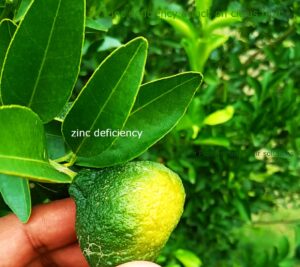Zinc Deficiency in the Citrus Garden
Zinc deficiency in citrus plants can influence citrus output in acidic or alkaline soils, although it is more likely to be a dangerous disease in alkaline soil. Acidic soils are more likely to promote citrus growth. Symptoms of zinc deficiency in citrus include leaves that are unnaturally, conservatively, and fairly packed, on single stems; this results in a clustered appearance. Zinc-deficient diseased leaves look so tinny and abnormally, conservatively, and crowded. Yellowing can be seen on the leaves of plants suffering from zinc deficiencies. Use zinc in the spring as a therapy and preventative measure for zinc deficiency. In this article, we will discuss zinc deficiency in citrus plants.
Deficiency of zinc symptoms in citrus
Fresh leaves are light green to yellow in color and have a network of veins that are a darker shade. In general, the leaf size is normal, and there is no noticeable shortening of the shoots. In extreme cases, the leaves get a very light color, almost white, and the color of the smaller veins fades until there is only a small amount of green left in the midrib. Trees that are grown on calcareous soils with high pH values suffer from iron deficiency. Which causes dieback, poor new growth, and very little or no fruit to be carried by the tree. In these circumstances, the plant does not have access to the iron that is necessary to produce chlorophyll.
Deficiency attack on Citrus
Zinc deficiency in citrus plants can cause the petals of citrus fruit to become yellow, as can the interior of the leaf. The leaves on the branches are quite small, yet there are plenty of them. The plant’s highest branches get erect, and it develops a yellowish color. The citrus gardens are susceptible to this disease, which is caused by zinc deficiency.
Citrus Zinc Deficiency Management
Zinc is an easy solution that will solve this problem for plants. This issue can be remedied by administering two hundred grams of zinc to plants that are at least four years old in the months of February, March, August, or September. It is important to exercise caution when managing irrigation, as excessive watering is another contributor to zinc deficiency in citrus plants. Therefore, the disease can be managed well with irrigation. Another factor contributing to zinc deficiency in citrus plants is the excessive application of phosphate fertilizer.
Control Method Zinc Deficiency in Citrus Plants
Foliar spray can control zinc deficiency attacks on citrus trees. Foliar spray’s best time is the spring season. The deficiency of zinc attacks in the citrus garden is not controllable in alkaline soil.

Potassium Deficiency Symptoms in Citrus
When it comes to growing citrus, potassium is a crucial mineral essential for optimal yields and fruit quality. About twice as much potassium is taken out of the ground as nitrogen is for every thousand pounds of oranges picked. Potassium is important for protein and starch synthesis, enzyme activation, and photosynthesis in all plant species. The potassium level is crucial in protecting plants from abiotic stressors because of its function in controlling the stomatal opening and shutting.
However, unlike nitrogen and phosphorus, potassium is not easily leached due to its positive charge (K+), which causes it to be attracted to negatively charged soil colloids. However, many Florida citrus groves are planted in soils with extremely low CEC levels. Potassium can be lost by leaching if these conditions exist. Potassium deficiency symptoms in citrus will show signs of marginal chlorosis in their mature leaves, which can progress to necrosis if left untreated. In potassium-deficient orchards, smaller fruit and defects like splitting and creasing are more common.

